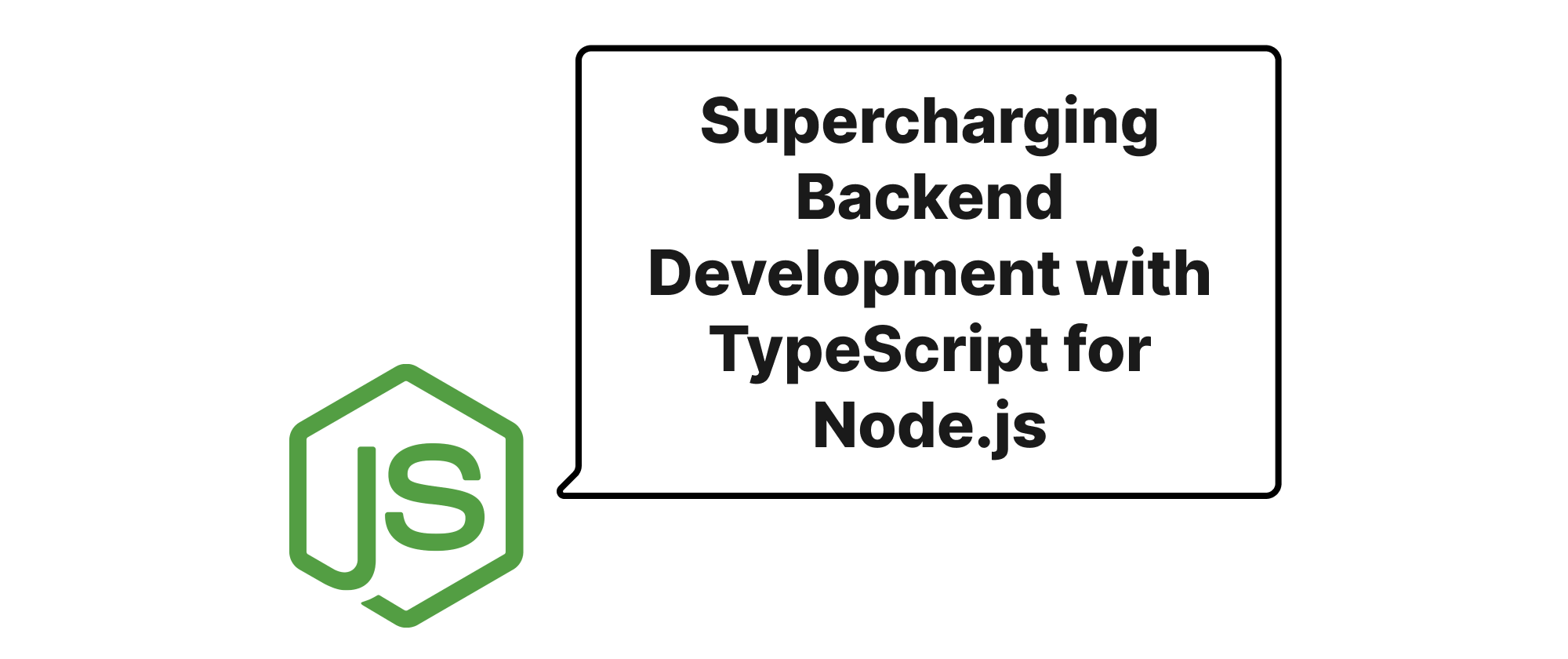Supercharging Backend Development with TypeScript for Node.js
Olivia Novak
Dev Intern · Leapcell

Introduction
In the fast-paced world of web development, JavaScript has cemented its position as the universal language, powering both front-end and back-end applications. Node.js, in particular, has enabled developers to build scalable and performant server-side solutions using JavaScript. However, as projects grow in complexity, maintaining codebases, ensuring data integrity, and collaborating within teams can become challenging due to JavaScript's dynamic and loosely-typed nature. This is where TypeScript, a superset of JavaScript, steps in, offering static typing and advanced language features that significantly enhance developer productivity and code quality. This article delves into how TypeScript, paired with ts-node-dev, can revolutionize your Node.js backend development experience, making it more efficient and less prone to errors.
Understanding the Essentials
Before we dive into the practical implementation, let's establish a clear understanding of the core tools we'll be discussing:
- TypeScript: At its heart, TypeScript is JavaScript with type definitions. It allows you to define types for variables, function parameters, and return values, catching potential errors during development rather than at runtime. It compiles down to plain JavaScript, making it compatible with any JavaScript runtime. Its benefits include improved code readability, easier refactoring, and better tooling support (autocompletion, intelligent error checking).
ts-node: This is a TypeScript execution environment for Node.js. It allows you to run.tsfiles directly without pre-compiling them to.js. Essentially, it acts as an on-the-fly TypeScript compiler for Node.js.ts-node-dev: Building uponts-node,ts-node-devis a development tool that automatically restarts your Node.js application when changes are detected in your TypeScript source files. It’s similar tonodemonbut specifically designed for TypeScript, leveragingts-nodeinternally for compilation. This hot-reloading capability dramatically speeds up the development feedback loop.
Elevating Your Backend Development Workflow
The synergy between TypeScript and ts-node-dev creates an incredibly powerful and efficient development environment for Node.js backends. Here's a breakdown of its principles, implementation, and application:
Principles of Efficient Development
- Type Safety from the Start: By writing code in TypeScript, you define contracts for your data and functions. This prevents common runtime errors related to incorrect data types and provides immediate feedback in your IDE.
- Faster Feedback Loops:
ts-node-devensures that every change you make to your TypeScript code instantly triggers a recompilation and server restart (if needed), allowing you to see the effects of your modifications almost immediately. - Improved Code Maintainability: With explicit types, it's easier for new developers to understand the codebase, and for existing team members to refactor or extend existing functionality without fear of introducing regressions.
- Enhanced Tooling Experience: IDEs like VS Code provide superior autocompletion, type checking, and intelligent refactoring features when working with TypeScript, significantly boosting developer productivity.
Setting Up Your TypeScript Node.js Project
Let's walk through an example of setting up a simple Express.js application with TypeScript and ts-node-dev.
First, initialize your project and install the necessary dependencies:
mkdir ts-backend-app cd ts-backend-app npm init -y npm install express dotenv npm install -D typescript @types/node @types/express ts-node ts-node-dev
Next, configure TypeScript by creating a tsconfig.json file at the root of your project:
// tsconfig.json { "compilerOptions": { "target": "es2018", // Specify ECMAScript target version "module": "commonjs", // Specify module code generation "rootDir": "src", // Base directory to resolve non-absolute module names "outDir": "./dist", // Redirect output structure to the directory "esModuleInterop": true, // Enables emit interoperability between CommonJS and ES Modules "strict": true, // Enable all strict type-checking options "skipLibCheck": true, // Skip type checking of all declaration files "forceConsistentCasingInFileNames": true // Disallow inconsistently-cased references to the same file }, "include": ["src/**/*.ts"], // Include all .ts files in the src directory "exclude": ["node_modules"] // Exclude node_modules }
Now, create a src directory and an index.ts file within it:
// src/index.ts import express, { Request, Response } from 'express'; import dotenv from 'dotenv'; dotenv.config(); const app = express(); const port = process.env.PORT || 3000; app.use(express.json()); // Enable JSON body parsing interface HealthCheckResponse { status: string; message: string; timestamp: string; } app.get('/', (req: Request, res: Response<HealthCheckResponse>) => { res.json({ status: 'ok', message: 'Server is running', timestamp: new Date().toISOString(), }); }); app.listen(port, () => { console.log(`⚡️[server]: Server is running at http://localhost:${port}`); });
Notice the use of type annotations like Request, Response<HealthCheckResponse>, and the HealthCheckResponse interface. These types provide immediate feedback if you try to return data that doesn't conform to the defined structure.
Finally, update your package.json with development and build scripts:
// package.json { "name": "ts-backend-app", "version": "1.0.0", "description": "", "main": "dist/index.js", "scripts": { "start": "node dist/index.js", "dev": "ts-node-dev --respawn --transpile-only src/index.ts", "build": "tsc" }, "keywords": [], "author": "", "license": "ISC", "dependencies": { "dotenv": "^16.4.5", "express": "^4.19.2" }, "devDependencies": { "@types/express": "^4.17.21", "@types/node": "^20.12.7", "ts-node": "^10.9.2", "ts-node-dev": "^2.0.0", "typescript": "^5.4.5" } }
Now you can start your development server with:
npm run dev
Any changes you make to src/index.ts will automatically trigger a server restart, and TypeScript will catch type errors right in your editor. For production, you can compile your code with npm run build and then run the compiled JavaScript with npm start.
Real-world Applications
This setup is ideal for:
- RESTful APIs: Enforce strict type definitions for request bodies, query parameters, and response payloads.
- Microservices: Ensure consistent data contracts between different services.
- GraphQL APIs: TypeScript integrates seamlessly with GraphQL schema definitions, providing end-to-end type safety.
- Any Node.js application requiring robustness: From CLI tools to complex server-side logic, TypeScript improves quality.
Conclusion
Embracing TypeScript in your Node.js backend development significantly enhances code quality, maintainability, and developer experience. When combined with ts-node-dev, the development feedback loop becomes incredibly tight, allowing for rapid iteration and a more enjoyable coding process. This powerful duo empowers developers to build robust and scalable Node.js applications with confidence and efficiency.
